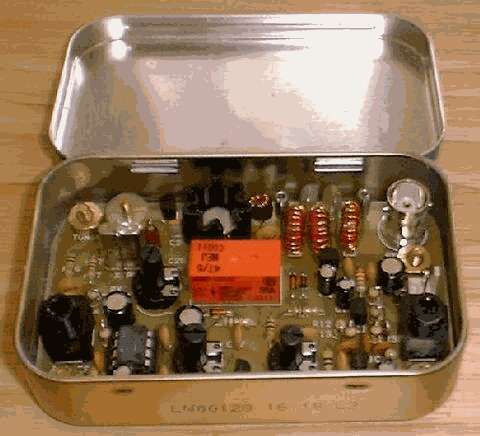








Last update 21-7-2003. Copyright OK1RP & OK1-35506.
|
FOXX-3 -
QRP CW TRANSCEIVER kits for HF bands from Kanga Products, U.K. - your home brew QRP experiment…
( From the kits manufacturer -
Kanga Products, U.K. web pages …)
You may have heard of the Pixie, the
VU Mini and the Micro 80. All of these transceivers use the PA transistor
as the receive mixer, but the original idea came from the UK and the well-known
QRPer George Burt GM3OXX in 1982. It first appeared in SPRAT in 1983.
The FOXX-3 is the latest version of the ever-popular FOXX. Designed by
Derek Alexander, it incorporates a sidetone oscillator, changeover relay
and low-pass filter. It fits inside an Altoids (TM) mint tin and all
connections are made via vertical connectors which are concealed when the
lid is closed. The connections are as follows:
- antenna
via 50 ohm BNC,
- power
via2.1mm co-axial connector or 2 pin 0.1" header,
- headphones
via3.5mm mono or stereo jack plug or 2 pin header,
- Morse
key via 3.5mm mono or stereo
jack plug or 2 pin header.

We also supply a small PCB-mounted
switch which can be used as the key for ultimate portability. All you need
to add are a 12 volt DC supply, headphones and an antenna and tuner. The
picture shows the first FOXX-3 built on a production PCB. Note the screen
printing which identifies all component positions. The optional push-switch
Morse key is fitted. Richard Newstead, G3CWI, recently operated a 40m FOXX-3
from the summits of Snowdon and Scafell Pike, the two highest peaks in
Wales and England, in a single weekend. Despite sub-zero temperatures,
Richard made 20 contacts in a total operating time of 80 minutes. Richard
told me, "FOXX performed brilliantly. Sidetone stops at -10 degrees C
but radio still seemed OK." "I didn't build any additional
filtering for the FOXX and it worked really well. No BC breakthrough at
all on either day."
Thanks for the info, Richard, but I won't be testing it at -10 C myself.
The FOXX-3 was launched at the Rochdale QRP Mini-Convention on October
28th 2000.
|